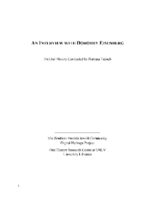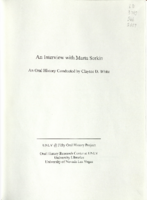Search the Special Collections and Archives Portal
Search Results

Transcript of interview with Don Ross by Barbara Tabach, February 15, 2017
Date
Archival Collection
Description
At the time of this interview, Don Ross has devoted nearly four inspirational decades of his life in the hotel and hospitality industry. In December 1987, at the age of 29, he accepted a position with Caesars and is now the Vice President of Catering, Conventions & Events for Caesars Palace Las Vegas. Don shares personal stories that lead to his “Don-mode” of providing a high level of customer service. From experiences with his grandparents to an extraordinary upbringing in his parents’ business, Green Chimneys, in Brewster, New York, Don received a surprisingly well-rounded educational foundation. As Don discovered his natural innate ability to serve others in the hospitality industry, he thrived and has never looked back. In recent years, his leadership talents and giving nature have been honored. In 2009, he was one of three distinguished industry executives recognized for their exceptional contributions to the hospitality industry as an “Industry Executive of the Year” during UNLV Harrah College of Hotel Administration’s 5th Annual Vallen Dinner of Distinction. Over the years, he has been honored for his work with Opportunity Village, his Jewish community involvement, and his continued work with Green Chimneys among many other organizations and causes.
Text

Transcript of interview with Yvonne and Joni Fried by Barbara Tabach, February 17, 2016
Date
Archival Collection
Description
Yvonne Fried, M.D., and Joan “Joni” Fried are the daughters of Milton and Esther Fried, the founders of Freed’s Bakery—the standard to which all other Las Vegas bakeries are held. When the Fried family moved to Las Vegas in 1955, Joni was born here, the fifth child, of the entrepreneurial Milton, a musician by night, and his industrious wife Esther, who guided the family business. As Esther’s 2006 obituary reads: in 1959 the couple opened “a snack bar, selling donuts and Danish, at the Panorama Market on West Charleston, while Milt played in the show band at the Sahara Hotel in the evenings.” For Yvonne and Joni, this made for a rather busy and interesting household to grow up in. Their Jewish upbringing was at Temple Beth Sholom. Photo above honors the multi-generations of the Freed’s Bakery tradition: (L-R) Joni Fried, Anthony & Sarah Fusco (Joni’s daughter) Max Jacobson Fried (Yvonne’s son) holding his son Lucas, and (far right) is his wife Emilia.
Text

Transcript of interview with Priscilla Schwartz by Barbara Tabach, June 16, 2016
Date
Archival Collection
Description
In this interview, Schwartz talks at length about her passion for compassionate hospice care, and her broad involvement with the Nathan Adelson Hospice, from volunteering to serving on the board to philanthropy, which included opening the Walter Schwartz Center for Compassionate Care. Schwartz also talks about other philanthropic giving which includes establishing scholarships at George Washington University and University of Michigan as well as support to Temple Beth Sholom gift shop.
Text

Transcript of interview with Dorothy Eisenberg by Barbara Tabach, October 23, 2014
Date
Archival Collection
Description
Interview with Dorothy Eisenberg by Barbara Tabach on October 23, 2014. In this interview, Eisenberg discusses her upbringing on the east coast and becoming a widow with four children. She met her second husband at a synagogue, and they moved to Las Vegas for a fresh start. Eisenberg became involved with Temple Beth Sholom, and the Las Vegas League of Women Voters. She has a school named after her in the Clark County School District.
Dorothy Eisenberg is a first generation American, with roots in Ukraine and Central Europe, and grew up in Philadelphia. Judaism was a significant part of Dorothy's life from the beginning, and both her and her brother spent many of their afternoons at Hebrew school and most weekends at Shabbat services as adolescents. Eisenberg moved to Las Vegas with her children and second husband in 1964. She became an influential member of the community and served as the Jewish Federation of Las Vegas's first female president. She was also actively involved in the League of Women Voters of Las Vegas Valley, including leading the organization's advocacy for school desegregation and serving as its president for two years.
Text

Transcript of interview with Marta Sorkin by Claytee White, March 2, 2009
Date
Archival Collection
Description
In this interview, conducted for the 50th anniversary of UNLV, Marta Sorkin discusses her family and her experience moving to California, and then to Las Vegas. Sorkin worked at the James R. Dickinson Library at UNLV and later in Lied Library, helping to implement and update various databases, and create displays on current topics. She briefly discusses her involvement with Hillel and the Jewish Federation of Las Vegas.
Marta Sorkin begins by reminiscing about her childhood in Far Rockaway Long Island, New York. She details the life her parents lived, which set an example for Marta and her two siblings. Through hard work, advanced education, and involvement in causes that were important to them, they created the template by which Marta lives her life. Marta describes her early work history, which included modeling, sales, library work, and working part time in her father's dry-cleaning plant. She and her daughter were living with her parents for a time in California, and they visited Las Vegas on weekends. It was during one of those visits that Marta met her second husband-to-be. They eventually married and decided to settle in Las Vegas. In Las Vegas, Marta enrolled at UNLV, became involved with the Preservation Association of Clark County, and volunteered at the Jewish Federation of Las Vegas. In addition, she completed her BA and MA degrees at UNLV and started working at the university's library. She details her work there, including creating display cases, working in the reference section, doing research for students and faculty, and compiling interviews. Marta also describes the fundraisers she spearheaded to help raise money for the various societies she was involved with: non-events, pancake breakfasts, dinners, and dance and band performances. In her closing comments she mentions an interview she did for Ralph Roske's class and expresses her appreciation for the career she's had at UNLV.
Text

Transcript of interview with Ron Lurie by Barbara Tabach, June 5, 2015
Date
Archival Collection
Description
Interview with Ron Lurie by Barbara Tabach on June 5, 2015. In this interview, Lurie discusses his family and his time in politics, campaigning for office, and some of his accomplishments while in office as mayor and in the city council. He also talks about growing up in Las Vegas and attending Las Vegas High School, and working for his father, Art Lurie, in the grocery store business.
Ron Lurie was a rambunctious teenager when the Lurie family moved to Las Vegas from California. He adapted quickly to Las Vegas and made fast friends. He is a 1958 graduate of Las Vegas High School. His father, Art Lurie, a supermarket businessman, was also a well-known professional boxing judge and a former Nevada Athletic Commission chair. In 1987 Ron became the first person of Jewish ancestry to be elected Mayor of Las Vegas. Previously, he was fourteen year member of the Las Vegas City Council and served on many community boards and commissions. Since political office was not a fulltime position, Ron's career path developed in a couple of different ways. He tells the story of becoming a butcher and the opportunities he experienced becoming a successful salesman of gaming machines for Si Redd, IGT and others. His over three decade gaming career continues as of this oral history. He is executive vice president and general manager of Arizona Charlie's Decatur location. In this oral history he reflects on some of his political accomplishments as mayor and city councilman. He also served six years on the State of Nevada Wildlife Commission and is a member of the Fraternity of the Desert Bighorn.
Text

Transcript of interview with Natalie Wolf by Barbara Tabach, October 22, 2016
Date
Archival Collection
Description
During this interview, Natalie shares stories of operating the bus station, a brief ownership of Commercial Deli (1987-1990), and her long career working collections for the casino industry. Her first position was at the Tropicana Hotel and has worked for MGM Properties, a loyal employee at the Mirage since 1990, starting a few weeks after the casino opened.
Text

Transcript of interview with Lovee duBoef Arum by Barbara Tabach, November 1, 2016
Date
Archival Collection
Description
Lovee Arum is the Chief Financial Officer of the Morris A. Hazan Family Foundation and Director of Hospitality for her husband Bob Arum?s boxing promotion company Top Rank. She holds a Nevada Real Estate Broker Sales License and was a partner in Western Linen (a Las Vegas linen rental and laundry company) for many years. Arum is a volunteer and philanthropist in the Las Vegas, Nevada community and works with organizations such as Temple Beth Sholom and the Nathan Adelson Hospice. In this interview, Arum reflects upon her childhood in Beverly Hills, California, and first experiencing Las Vegas after her father, Morris Hazan, established Western Linen. She discusses adjusting to Las Vegas life after moving to the city with her first husband, Larry duBoef, in 1963, and raising her daughter and son within the local Jewish community. Arum also talks about meeting her current husband, Bob Arum, and her various philanthropic activities, including Junior League, United Jewish Appeal, Keep Memory Alive and establishment of the Lou Ruvo Center for Brain Health.
Text

Transcript of interview with Walter John Ritzau by Elizabeth Garrison, February 25, 1977
Date
Archival Collection
Description
On February 25, 1977, Walter John Ritzau interviewed Elizabeth Schneehagen Garrison (born 1943 in Las Vegas, Nevada) about her life in Southern Nevada. Garrison first talks about her schooling in Las Vegas and her first homes in Las Vegas. She also discusses the atomic testing, the Devils Hole in Ash Meadows, early church involvement, recreational activities, and some of the environmental aspects of Las Vegas. Garrison later describes her work for the Central Telephone Company before describing the Helldorado parade and some of the early activities designed for children. In the latter part of the interview, she describes her father’s garden, the changes in the city environment and building, shopping locations, and more about her home life.
Text

Transcript of interview with Agnes Gauger by Coleen Mancini, February 24, 1977
Date
Archival Collection
Description
On February 24, 1977, Coleen Mancini interviewed the claims manager for the Culinary Workers and Bartenders Insurance Fund, Agnes Gauger (born Coleen Evans on November 21, 1926 in Arkansas) in her home in Las Vegas, Nevada. Mrs. Gauger’s daughter, Traci Sturdivant was also present during the interview. This interview covers significant changes and growth in Southern Nevada, including gambling and other industries, family life and recreation, and early atomic tests. Mrs. Gauger also discusses housing in the Las Vegas, Howard Hughes, McCarran Airport, medical facilities and education in Southern Nevada.
Text
